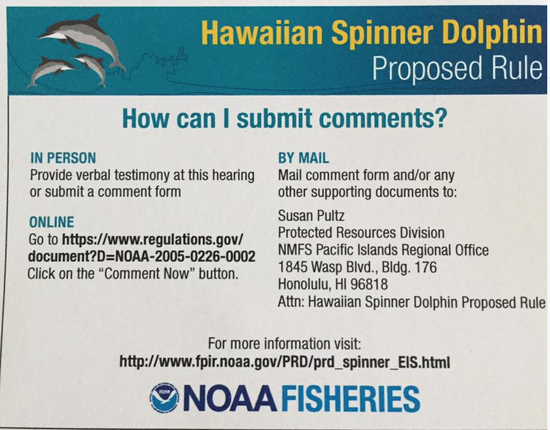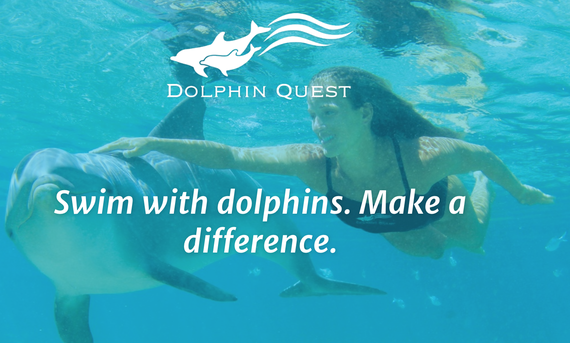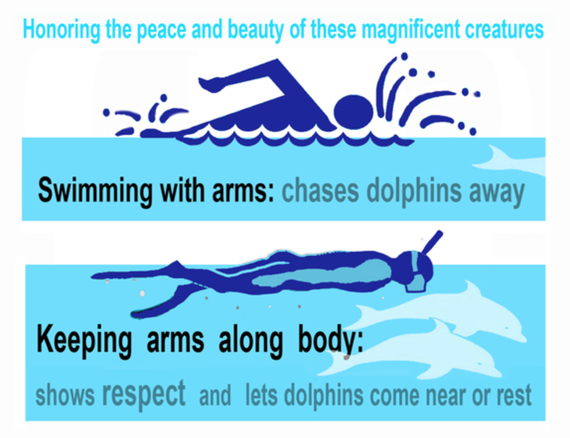
In the Hawaiian islands you may have a life-changing experience in nature with marine-life while swimming in certain places. In particular are the beloved Hawaiian Spinner Dolphins, who enjoy many of same places that humans like to swim and snorkel at. Unfortunately, this human impact can be harmful to the dolphin when people are uninformed or the dolphins are exploited in their natural habitat. Often dolphin tours interfere with the life-cycle, feeding, and sleeping habits of these beautiful creatures. In order to address this issue, Hawaii is taking public input about legislation to protect the Spinner Dolphins that has weak points and strong points but most importantly invites your input.
The proposed new regulation that will make it illegal to swim in proximity with free-swimming dolphins in Hawaii, at first glance, looks like an interest in and protection of the Cetaceans in our beautiful waters. There are many more concerns of significant importance, currently under your jurisdiction, much more dangerous and harmful to the cetaceans, that HAVE FAILED to be addressed. -Save Dolphin Swims
If you are snorkeling and the dolphins come near you, it is usually by their own choice, which makes the experience all that much more magical. In this setting, the dolphins can easily swim away from you and there is no way you can catch them. However, if you are on a dolphin tour boat that is looking for them, chasing them, or disturbing them at regular intervals this is problematic. That's why Protective Regulations for Hawaiian Spinner Dolphins under the Marine Mammal Protection Act is being proposed. Though well-intentioned, the legislation is missing caveats for Traditional Hawaiian Practices, and to allow for the natural interactions that sometimes occur between swimmers and the dolphins. Below is a summary that is requesting public comment:
We, the National Marine Fisheries Service (NMFS), propose regulations under the Marine Mammal Protection Act (MMPA) to prohibit swimming with and approaching a Hawaiian spinner dolphin within 50 yards (45.7 m) (for persons, vessels, and objects), including approach by interception. These proposed regulatory measures are intended to prevent take of Hawaiian spinner dolphins from occurring in marine areas where viewing pressures are most prevalent; prohibitions would apply in waters within 2 nautical miles (nm; 3.7 km) of the Hawaiian Islands and in the waters between the islands of Lanai, Maui, and Kahoolawe. This proposed rule to establish 50-yard swim-with and approach regulations would help ensure public compliance by providing clear notice of prohibited conduct that results in take, including harassment and disturbance.
Concerned citizens are echoing a chorus of opinions to this complex issue. Humanity's increasing disconnection and misunderstanding of nature/wildlife is problematic on many levels. Regulations should always be adopted in conjunction with active educational outreach. When humans understand the sea mammals, and the local environment at-large, they can learn to respect what they love, and they will be more likely to heed regulations. In addition, industry is often held unaccountable for their impact or even lobbies to influence legislation to favor their interests.
The NOAA (National Oceanic and Atmospheric Association) proposal is supported by research that is funded in part by Dolphin Quest. This would be natural for an organization that works to protect marine life, though community members suspect a conflict of interest. Dolphin Quest provides dolphins in captivity for tourists to swim with, a business model that is controversial in its' own right. Currently there is a global movement to end this practice that has been focused on Sea World.
I have enjoyed reading various comments and perspectives on social media. Any time citizens become directly involved in protecting or preserving nature and wild life we can always applaud. The most passionate, and well-researched statement I have read comes from D.W. Webster. This is a valuable as a template for you when submitting your own public comments:
Of utmost importance to those of us really concerned with the welfare of Cetaceans, are the current sanctions approved by NMFS that allow for the massive killing, harassment and enslavement of hundreds of thousands of Cetaceans every year.
- NMFS permits the yearly wholesale by-catch slaughter of thousands of Spinner dolphins by the Tuna Industry while still maintaining "Dolphin Safe" labeling on products.
- NMFS has sanctioned "takes" of millions of Cetaceans by the US Military in weapons testing and use and subsequent slavery of certain varieties of dolphins being used as actual live weaponry.
- NMFS allows the unbridled onslaught by the Oil industry using piercingly loud seismic equipment (louder than LFAS) and explosives with little or no regard to surrounding sea life and creating oil spill disasters that destroy entire cetacean and sea life habitats.
- NMFS still issues permits to the captive dolphin industry that would allow them to hunt down dolphins in the wild in US waters and once captured releases all responsibility for their wellbeing to the Dept. of Agriculture.
- NMFS allows the shipping industry to flood the oceans with noise pollution known to disturb and potentially harm the cetaceans.
- NMFS has looked the other way while chemical toxins are leaching into multiple shoreline areas.
NMFS should examine its own role in these, by far, more critical issues facing Cetaceans and their survival from the unbridled assault by this military/industrial complex. If the intention truly is to protect the cetaceans, you need to look at these current practices under your jurisdiction. These need to be reviewed immediately and steps need to be taken to cease these horrific sanctions.This is more life-giving than suggesting a relative handful of humans that float among free swimming wild dolphins presents a serious threat as it's something the dolphins either choose to do or do not. This especially in light of recent stock assessment over these past 5 years that show NO REDUCTION IN LOCAL STOCK. And testimony from local professionals going out every day on dive and snorkel boats, that the numbers of Spinner dolphins on the Kona coast is actually going up.
There are far more affective ways that we can combat real dolphin abuse than the creation of such regulations that prevent all interaction in the wild.
It is my experience that separation breeds apathy and ignorance, paving the way for the cetaceans' continued abuse by stupid people with no one responsible around to deter such activity.Everyone that I know who live and play in these waters are very concerned and protective of the dolphins. Dolphins and whales are a valued resource of the ocean and our world and have every right to living free of harassment and infringement of their lifestyle. It is our experience that, with a few exceptions, encounters are conducted in a respectful manner.
I offer these suggestions, allowing safe human/dolphin interaction. If the NMFS agency is sincerely interested in addressing the problem, consider some of the following as noteworthy examples of how to enlighten, as opposed to intimidate, potential offenders who may carelessly be placing dolphins at risk:
- Clear and factual information flow through public forums and media.
- Dolphin-swim Certification programs approved by a non-governmental agency such as those with the Humane Society, the Sierra Club or PADI scuba certification.
- Professional Associations of guides, boat operators and rental companies empowered to self-regulate such programs.
- Physical outposts distributing real, non-intimidating, factual information in problem areas where the public has been shown to be reckless in their interaction with dolphins.
- Promotion of positive information about the nature of dolphins and their behavior that will serve to encourage respect for their environment and domain.
- A public accessible database fully supported with government funding that will act to proliferate positive and factual information rather than the current system of negative press and police intimidation being used by this NMFS administration.
These are but a few of many constructive ideas that are already available and will serve the greater need for understanding and respect of the Cetacean race by humans and more importantly may help to preserve the most precious resource known to us: Planet Ocean. -D.W. Webster
Please take a moment to inform yourself and make a comment on this proposed rule. Cetaceans are not too different from us humans in many ways, as they are mammals who have been on the planet 2-3 times longer than us. They should be understood and respected as sentient, intelligent beings, and our actions towards them should respect that. Like most things, the issue is not black and white, therefore a combination of regulation that respects natural interactions with dolphins, and regulation for exploitative boat tours seems like a logical balance.
There is a petition called Education over Regulation, with almost 1,000 signatures which inspired this article. You can submit your comments and learn more about what is being proposed at this link (button to submit your opinion in the upper right-hand corner of the page). Please don't delay as submissions are only being accepted through through October 25, 2016.



